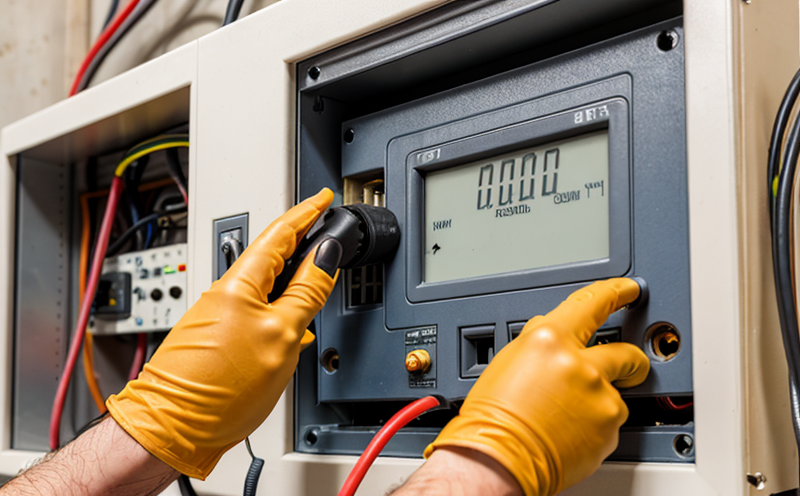DIN EN 50342 Electrical Testing of Lead-Acid Starter Batteries
The DIN EN 50342 standard is a European regulation that specifies the electrical testing procedures for lead-acid starter batteries. This standard ensures the quality and safety of these batteries, which are crucial components in automotive and industrial applications. Compliance with DIN EN 50342 is essential to meet regulatory requirements and ensure product reliability.
The primary focus of this service is on the electrical performance testing of lead-acid starter batteries, particularly in terms of their ability to deliver reliable power under various conditions. Testing includes charging efficiency, discharge capacity, internal resistance measurement, and load tests at different temperatures. The standard mandates rigorous procedures to ensure that each battery meets strict criteria for safety, durability, and reliability.
In this service, we use state-of-the-art equipment such as load testers, electrical impedance analyzers, and temperature-controlled chambers. These tools allow us to simulate real-world scenarios accurately. For instance, the load tests can be conducted at both ambient and low temperatures (as defined by the standard). This ensures that the batteries are evaluated under conditions they will experience in actual use.
The testing process is detailed and comprehensive. It begins with visual inspection followed by a series of electrical tests, including but not limited to:
- Charge acceptance capacity test
- Discharge capacity measurement
- Internal resistance determination
- Cycling endurance tests
- Load tests at specified temperatures
The data collected during these tests is meticulously analyzed and reported. Compliance with DIN EN 50342 requires strict adherence to the acceptance criteria outlined in the standard, which vary based on battery type and capacity.
This service is highly relevant for manufacturers, quality managers, compliance officers, and R&D engineers involved in lead-acid starter batteries. By ensuring compliance with this standard, we help our clients meet regulatory requirements while enhancing product reliability and safety. Our expertise ensures that the testing process is both accurate and consistent across different batches of batteries.
Scope and Methodology
The scope of DIN EN 50342 electrical testing covers a wide range of parameters to ensure the quality and reliability of lead-acid starter batteries. The methodology involves several key steps:
- Visual Inspection: Every battery undergoes thorough visual inspection for any signs of damage or defects.
- Electrical Testing: This includes a series of tests to evaluate the electrical performance, such as charge acceptance capacity and discharge capacity. Internal resistance is also measured using specialized equipment.
- Cycling Tests: Batteries are subjected to repeated charging and discharging cycles under controlled conditions.
- Load Testing: The batteries are tested with varying loads at different temperatures, simulating real-world operating conditions.
The testing process is conducted in accordance with the latest versions of DIN EN 50342. This ensures that all tests are performed under standardized and regulated conditions. The results of these tests are meticulously documented and reported to our clients.
| Test Parameter | Description |
|---|---|
| Charge Acceptance Capacity | The ability of the battery to accept charge during a specified period. |
| Discharge Capacity Measurement | The amount of energy that can be delivered by the battery under load. |
| Internal Resistance Determination | Measurement of resistance within the battery, which indicates its health and performance. |
| Cycling Endurance Tests | Repetitive charging and discharging cycles to assess long-term durability. |
| Load Testing at Different Temperatures | Evaluation of performance under varying environmental conditions. |
The results from these tests are analyzed and compared against the acceptance criteria specified in DIN EN 50342. Compliance with these standards ensures that the batteries meet the required levels of reliability, safety, and efficiency. Our detailed reports provide comprehensive insights into each battery's performance characteristics.
Industry Applications
The DIN EN 50342 electrical testing service is widely used in various industries where lead-acid starter batteries are essential components. These applications include automotive, aerospace, and industrial sectors:
- Automotive Industry: Ensuring the reliability of starting systems.
- Aerospace Industry: Critical for reliable power supply during critical operations.
- Industrial Applications: Supporting continuous operation in demanding environments.
In the automotive industry, compliance with DIN EN 50342 helps manufacturers ensure that their vehicles meet safety and performance standards. In aerospace applications, these batteries are crucial for mission-critical systems. For industrial use, reliability is paramount to maintain production schedules and avoid downtime.
| Industry | Critical Applications |
|---|---|
| Automotive | Reliable starting systems for vehicles. |
| Aerospace | Power supply for critical operations. |
| Industrial | Continuous operation in demanding environments. |
The detailed testing process ensures that batteries perform consistently across different environmental and operational conditions. This is particularly important given the diverse operating environments encountered by lead-acid starter batteries in various industries.
Competitive Advantage and Market Impact
Compliance with DIN EN 50342 provides significant competitive advantages for manufacturers and suppliers of lead-acid starter batteries. By ensuring that their products meet the highest standards of quality and reliability, companies can:
- Earn a reputation for producing high-quality, reliable products.
- Avoid recalls and product liability issues by meeting stringent regulatory requirements.
- Gain market access to regions with strict compliance regulations.
- Increase customer confidence and loyalty through consistent performance.
The global demand for lead-acid starter batteries is expected to continue growing due to the increasing number of vehicles on the road. Ensuring compliance with DIN EN 50342 can help companies stay ahead in this competitive market by delivering products that consistently meet or exceed industry standards.
In addition, by offering a comprehensive testing service, we assist our clients in maintaining their competitive edge and meeting customer expectations. This is particularly important as the automotive and industrial sectors continue to evolve and place greater emphasis on reliability and safety.





